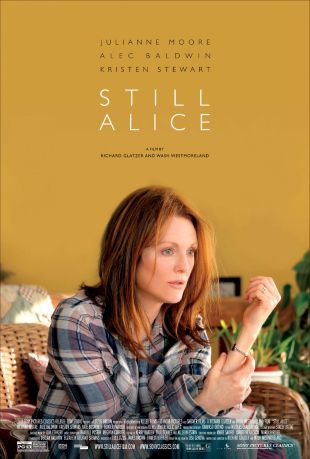
There's a rich tradition of movies in which a character slowly succumbs to a terminal illness, partly because they give actors a chance to show off, and partly because they let audiences experience the catharsis that tragic stories offer. Still Alice certainly has a superb lead performance in Julianne Moore, but directors Richard Glatzer and Wash Westmoreland focus more on the situation than the story.
Moore plays Alice Howland, a renowned linguistics professor at Columbia who's happily married to a fellow professor named John (Alec Baldwin). They have three grown children, and everyone seems happy, healthy, and successful. However, when Alice starts forgetting words and getting lost while jogging around campus, she worries that something is wrong. Her worst fears are confirmed when a doctor diagnoses her with early-onset Alzheimer's. As Alice and her family adjust to her mental deterioration, youngest daughter Lydia (Kristen Stewart), an aspiring actress who lives on the West Coast, grows closer to her mom -- which comes as a surprise to everyone, given their history of fighting with each other.
This kind of medical and family melodrama wouldn't have felt out of place in 1930s cinema, or on Lifetime today. On the page, it's an old-fashioned, three-hankie tearjerker, but Glatzer and Westmoreland - who both co-directed and co-wrote the script from a novel by Lisa Genova -- mostly avoid big emotions. People weep quietly in this film rather bawl with maximized anguish.
Julianne Moore is flawless as Alice. Her eyes betray the terror she feels when simple words elude her, even as she tries to make others feel at ease. She handles the most melodramatic scene, in which she has to tell her kids that her condition is hereditary and they should get tested for it, with admirable restraint.
The supporting cast are terrific as well, especially Baldwin as the model of a dutifully patient and loving husband. He has a heartbreaking final scene with Kristen Stewart in which he finally reveals the toll his wife's condition has taken on him, and it's the most affecting moment in the movie because it's such a straightforward depiction of profound human weakness. Not every viewer will be able to put him or herself in Alice's place, but there isn't a person alive who won't empathize with someone who feels that he has failed the greatest test of his life.
Still Alice would have been a far more engaging experience if the filmmakers had managed to find more moments like this. Unfortunately, the tempo of the movie gets bogged down in an endless cycle in which Alice has moments of clarity and then regresses, with her loved ones forever adjusting to continually worse levels of "normal." That's the reality for anyone living with such a serious illness, but it doesn't automatically make for compelling drama. As good as Moore and Baldwin are, it's a chore to watch this movie.
